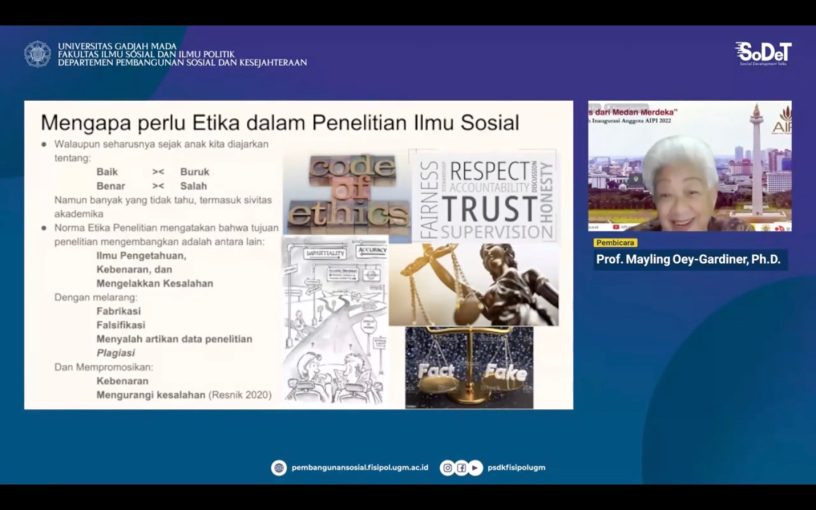
Yogyakarta, May 18th 2022─The Department of Social Development and Welfare of the Faculty of Social and Political Sciences UGM held a book review session entitled “Code of Ethics in Social Science Research in Indonesia” in the Social Development Talk program on Wednesday (18/5). This event presented the author of the book Mayling Oey-Gardiner as the speaker and Janianton Damanik as the lecturer of PSdK Fisipol UGM as the discussant.
The book, which was published in 2021, has been in the works for three years since 2018, together with his two students, Fandy Rahardi and Canyon Keanu Can. The writing of the book departed from Mayling’s concern about the development of science. She thinks that the development of science is not based on the circumstances around her. Mayling said that when she was a lecturer at the Faculty of Economics and Business, University of Indonesia, she saw that students were not used to collecting data but instead used data collected by other people.
According to Mayling, science can harm people and it is the researchers who are responsible. Meanwhile, ideally, research should be aimed to develop knowledge and finding the so-called “building blocks” to construct a structure. To get that building block we need to find the truth and avoid mistakes.
“At the same time, the research prohibits fabrication, falsification, misinterpretation of research data, and plagiarism. Instead, what we need is to promote truth and reduce mistakes,” Mayling said.
A code of ethics is needed to minimize violations in research. However, in the Indonesian context, people tend to only talk about plagiarism, even though there are many other forms of violation. Research by Fourianalistyawati in 2018 said that 47.5% of the 160 universities in Indonesia surveyed did not have an ethics committee. However, awareness of the importance of research ethics remains high, especially with the increasing need for collaboration with international institutions and researchers.
“Ethical dilemmas will continue to grow. Resolving the latest ethical dilemmas requires relentless adaptation, and also requires an ethics committee with high standards,” says Mayling.
Meanwhile, Janianton said, just by reading this book, he was immediately confronted with the knowledge of the many forms of ethical violations in research. This book is a guideline for safeguarding the integrity of social researchers in Indonesia. Research has the potential to ignore wise practices in the use of resources for the sake of scientific performance. To reduce this, research ethics is needed.
“This book emphasizes how research ethics is actually one of the tools to achieve basic research goals. This is very important for us to think that research ethics is a fixed price, if ethics are violated then all values in the research product become useless, “said Janianton. (/WP)
